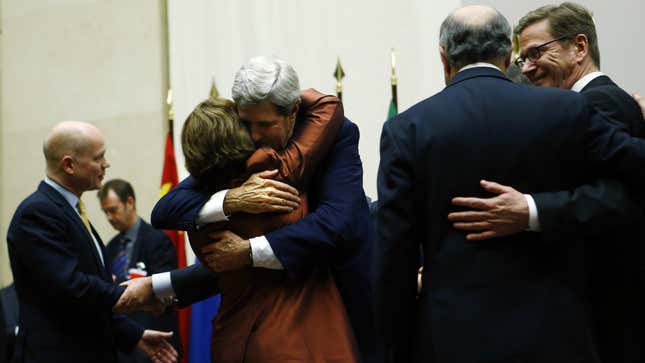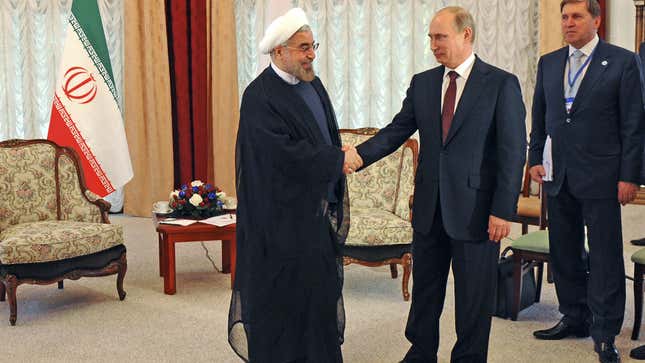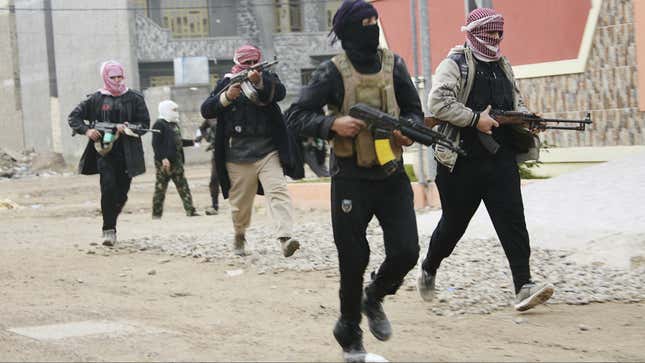Will Iran and the broader world strike a long-term deal this year? Will Iraqis and Syrians tamp down their respective civil wars, and will Iran help to get them there? What about China and Japan? Will they go to war over the Senkaku Islands?
In the US, will former National Security Agency (NSA) contractor Edward Snowden be welcomed home from self-exile in Russia, now that Americans understand the NSA’s excesses? And will the four-decade-long scars of the Arab boycott be put aside so that the US can again export crude oil?
These are the six questions we’re considering in Quartz’s annual geopolitical forecast. To puzzle them out yourself—or to take on other geopolitical conundrums—we offer up Quartz’s global events algorithm, our 15 common-sense rules of geopolitics (here are the first 14 plus the 15th). These are general guidelines for figuring out the direction of big events. Last year, they resulted in our correctly predicting five out of six geopolitical questions.
We welcome your forecasts with an explanation of how you reached them, using our rules or your own (s@qz.com). Here are our own predictions for the coming year based on our algorithm.
Iran and the outside world will strike a big deal…

For the same reasons that we foresaw the interim agreement, we expect a broad, long-term accord in 2014 that scales down Tehran’s nuclear capability in line with international demands while also gradually lifting sanctions on the country.
Working against a deal is local politics (Rule 14), and a tendency for xenophobia, nationalism and jingoism to disrupt the most rational foreign policy. In this case, distrustful hardliners in both Tehran and Washington persistently cast doubt on the possibility of any reliable and consequential agreement. That these forces include True Believers (Rule 11) (these are ideologues whose actions arise from faith in their infallibility) makes striking a deal harder. But as stated above, the weight of the rules favors a follow-on accord.
Why? In Iran, local politics (Rule 14) and the Staying in Power Rule (Rule 7) (the universal desire of politicians everywhere to retain their perquisites of office) favor striking a deal. So does the Precipice Rule (Rule 2), the tendency of decision-makers to make what they perhaps believe to be sincere threats and ultimatums, but then retreat just shy of an ultra-destructive abyss. In the case of Iran, oil and financial sanctions have taken their toll on ordinary Iranians and jeopardized political stability. This fueled the rise of the 2009 Green Movement, which mounted mass protests and prompted a debilitating government crackdown. The sanctions have significantly toughened since then, and the country’s supreme leader, Ali Khamenei, would like to avoid revisiting 2009’s troubles. He has offered public political support to President Hassan Rouhani, Iran’s former nuclear negotiator, who was elected last June after promising more normalized relations with the outside world. The interplay of Rules 14, 7 and 2 trumps Khamenei’s competing instincts as a True Believer (Rule 11) and leader of a perceived Great Power (the Mountain Rule, No. 12).
Meanwhile in Washington, US president Barack Obama is keen to resolve his thorniest foreign policy question: how to stop Tehran from its presumed push to develop nuclear weapons. Obama would also like to avoid the precipice (Rule 2)—the crisis that would erupt should Israel and Saudi Arabia become convinced that Iranian nuclear capability is imminent, and launch an attack.
Both Washington and Tehran feel time pressure because the political clock is ticking (Rule 14, local politics). Obama can manage a deal this year and a bit into 2015, but after that the prelude to the 2016 presidential campaign will pick up. An already reluctant Congress will be far less inclined to repeal financial sanctions, and negotiations would probably have to wait until the uncertainties of the next administration. Therefore, both the US and Iran will try to conclude their talks well before Obama becomes a political afterthought.
Indeed, we see a broader geopolitical framework unfolding. The negotiation challenge will no longer be just the nuclear matter, but whether Iran can become an accepted player in the resolution of other regional questions. We address this question next.
…and Russia and Iran will take a larger role in global crises.

In 2013, Russia circumvented the US and Europe. It cut a deal to eliminate Syria’s chemical weapons arsenal while offering Obama an exit from a bombing campaign against Damascus that he never desired. Much sturm und drang followed. What would happen now that the Middle East was subject to greater Russian influence after the spillage of much Western blood and money? The worst fears all but vanished when what seemed impossible—that Syria would surrender its chemical stockpile—began to take place.
Say what you will about Russian president Vladimir Putin (and we have), but it’s hard to imagine anyone other than Syrian president Bashar al-Assad himself achieving the same decisive outcome. Putin probably intruded at least in part to poke a finger in Washington’s eye, but there are other, deeper reasons for his likely attempt at more such interventions–he is leader of a former superpower (Rule 12) and a Big Personality (Rule 10) (a figure with the desire, skill and tendency to move events).
What’s worrisome here is that Russia is attempting to pull Iran, Assad’s main regional ally, into the UN-sponsored effort to resolve Syria’s civil war. Moscow’s stated reason is that, because of Iran’s umbilical alliance with Syria, it by definition must be part of any resolution. The outside world is rightly suspicious: When you combine a True Believer (Rule 11) and a perceived or former Great Power (Rule 12), you can end up with a world of mischievous spoiler countries.
We’re banking on some countervailing forces to balance this out. The Rule of Averages (Rule 9) states that while nations, leaders and events veer to extremes, they eventually settle somewhere back in the middle, driven by business interests and public pressure. This propensity is not altruistic, but carried out in service of staying in power (Rule 7) and the new recognition that, to be treated as a Great Power, they must notch down their tone.
The rules and the context of events suggest that both Iran and Russia are moving in that direction. But, considering history, they will conform to agreed-upon principles only if the global community is united on that front. In that vein, the US and France rightly demanded on Jan. 20 that Iran commit to the UN-backed position on Syria before being permitted to join the international negotiations to resolve the civil war. Tehran, perhaps poorly coached by Russia, did not fully grasp the rules at that time. But look for Iran try again later in the year.
Pandemonium will prevail in Syria and Iraq, but not irredeemably so…

Syria and Iraq will go on much as they have, which means another year of unyielding killing and injury. On the rebel side, the attacks will be propelled largely by two undercurrents: the Injustice Rule (Rule 4), which explains popular uprisings that erupt from perceived victimization, and the True Believer Rule (Rule 11), in this case the fervor behind Sunni jihadists fighting under the banner of al Qaeda in both Iraq and Syria.
A crucial factor favoring Assad is that much of the fighting will be rebels fighting each other. But the government itself will maintain a ferocious offensive as well to defend its power (Rule 7). The Assad regime’s greatest enemy remains not the rebels but the Caesar Rule (Rule 6), which states that in times of great stress, a dictatorial leader is often most vulnerable to defection or assassination at the hands of his own supposed allies and followers. That is, if Assad goes, it is likelier to come from within the palace than from rebel forces or the international community.
As for Iraq, the country’s prime minister, Nouri al-Maliki, is maneuvering for reelection in April, and toward that is battling the jihadists in Anbar Province to help project strength. If he does return as prime minister, he will continue to seek to maintain Shiite political support by suppressing the Sunni minority.
Therefore, in Iraq and in Syria, violence will persist even if the extremists are scattered by more moderate rebels, local tribes and government forces. Neither country seems to have reached the more advanced stage that ushers in the Rule of Averages (Rule 9), in which the influence of True Believers, Great Power obsessives and other extremists wanes, and the more moderate middle takes over.
Still, neither country will crumble into unmanaged chaos (a conclusion informed by an excellent contribution by Paul Khuri, a Middle East specialist and student of mine at Georgetown last semester). This is because of the Muddle Along (Rule 1) and Precipice (Rule 2) rules; both countries will pull back from the edge and muddle through.
…and the East and South China seas will be no picnic, either

Brinkmanship between China and Japan will go on, but the Asian giants will steer away from outright war.
Both sides are at fault for the current tension, which goes back more than three years; in 2013 alone, Beijing provocatively claimed predominance in the waters and the air around the East China Sea, Japan significantly increased military spending, and Japan’s prime minister Shinzo Abe visited a controversial World War II memorial. Three undercurrents are at work in their actions; both demand control over what Japan calls the Senkaku islands (Territory Rule); both have a sense of unaddressed wrongs by the other side (Injustice Rule); and both regard themselves as great powers deserving of broad latitude (Mountain Rule).
Normally, this combination is sufficient to see actual fighting. That none has occurred is thanks to the Precipice Rule (Rule 2). Neither country seems willing to risk the damage to their economies if they go to war. For that reason alone, we believe they will continue to stand back from fighting this year as well.
If conflict does erupt, it will be not that anyone wants it, but because of the unpredictable Rule of Miscalculation (Rule 15) (a conclusion reached with the assistance of Chelsea Goldstein, a threat reduction specialist and student in my Georgetown class last semester). That is, China and Japan have so charged the atmosphere as to leave very little latitude for even a mere blunder. Shots fired in haste or by mistake could trigger a similar response, after which other rules would take charge, especially the Local Politics Rule (Rule 14), making both sides answerable to the emotions and prejudices of their people and ruling circles. Common sense tells you that even in this case, the Precipice Rule would ultimately step in (that is, shooting would be short-lived because a longer conflict would be too risky for regional economies). But one cannot precisely judge the period between the first shots fired (the miscalculation) and the appearance of cool heads (the pullback from the precipice).
The US will retain its crude oil export ban

US oil companies, the International Energy Agency (IEA) and some politicians urge the repeal of a 1970s ban on the export of crude oil. They say the ban is a relic of a bygone era—the time of the 1970s Arab oil embargoes—and prevents the US from fully capitalizing on its shale oil boom. Their rational arguments include that US exports would help to create a global surplus, puncture high prices, and thus benefit consumers everywhere. Some of the most prominent oil voices, including Citi’s Edward Morse and industry consultant Daniel Yergin, suggest that the repeal advocates will succeed, at least to some degree.
Quartz’s call is that the export ban will not be lifted, not in 2014 anyway. The operative rule is local politics (Rule 14). Morse, Yergin and the others are rational and logical, and that is precisely the weakness of their argument. Americans are neither cool nor rational when it comes to oil. They are hot-under-the-collar, emotional and nationalistic. Very much like the Chinese, the Venezuelans and Russians whom US officials are prone to criticize for unfair playing rules in their oilfields, Americans regard their country’s crude oil as patrimony. The Obama Administration could open up the spigots a smidgen, allowing a bit more than the current Alaskan and California exceptions to the ban, and still not send the country into a tizzy. But it would be a political error to go further. So by and large, the crude from the shale oil boom will be kept at home.
Yet in a way the debate is a red herring, because the oil will get out—only not as crude. While the law bans oil exports, it freely allows the shipment of products made from that crude such as diesel and gasoline. So at some point in 2014—once oil producers accept that the export ban is likely to remain largely intact—look for a boom in refinery reconfiguration to handle the light oil produced from shale. And following that, a boom in the export of diesel, gasoline and other products. The explanation? The Getting Rich Rule (Rule 13).
There will be no deal for Snowden

The tide has shifted for Edward Snowden, with open calls for clemency or amnesty. Snowden defenders say that while the former NSA contractor stole and released a trove of ultra-secret intelligence, he did a service by disclosing the agency’s surveillance of seemingly anyone of consequence on the planet. And as a result, those practices are changing. Snowden’s actions are explained by his role as a True Believer. The classic examples of True Believers are ideological leaders and movements such as the Taliban or the late Hugo Chavez of Venezuela. But Snowden represents another dimension of the rule: the little guy theory of history, the rare cases in which just some dude alters everything.
US authorities say with their own conviction that Snowden will be granted no leniency, and we believe them; he will be neither amnestied, pardoned nor offered a relatively short sentence. We get there through the Staying in Power (Rule 7) and Local Politics rules (Rule 14). That is, if Obama signs such an order, he would be immediately pilloried as a dupe, and inflict immense political damage on himself and perhaps his party. No US leader would do something so self-destructive. Not in 2014 anyway.
